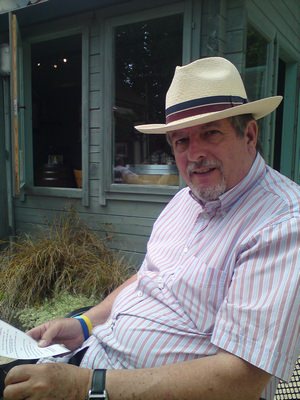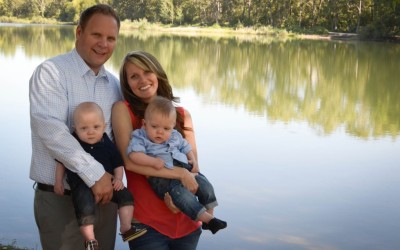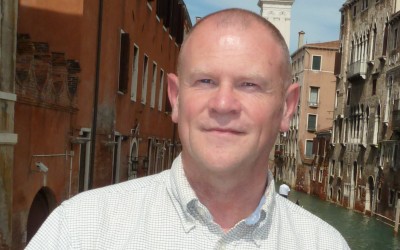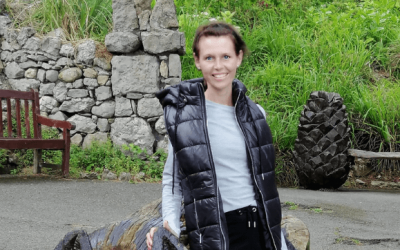After having pains in my side, which turned out to be gallstones, the radiologist was rather puzzled by ‘a fluid in my stomach’.
In the summer of 2008 after having pains in my side, which turned out to be gallstones, and not feeling at all well I went to see my Doctor who sent me to Bristol General Hospital to have an ultrasound scan. During the examination, the radiologist was rather puzzled by, as she said ‘a fluid in my stomach’.
The following week I was sent to the Bristol Royal Infirmary (BRI) for a CT scan. After the CT scan, it was then decided by the consultant at the BRI to try and extract some of the fluid. While recovering at the hospital the young consultant then said to my wife, Ruth, that I would have to go to Basingstoke Hospital for specialist treatment. I did not know at the time that it was a rare form of cancer, but as soon as Ruth got home she ‘googled’ Basingstoke Hospital and discovered that they treated pseudomyxoma peritonei (PMP).
She kept this quiet from me for two weeks until our visit to see Tom Cecil, the specialist consultant at Basingstoke Hospital in October. All was then revealed to me and at the time told it would be a 10-hour operation and arrangements were put in hand for me to have the operation at Basingstoke in December.
The hospital kindly also looked after my wife in the nurses quarters during my stay. My operation was performed on December 2nd, 2008 and took 14 and a half hours. I was then sent to intensive care for a couple of days with tubes leading out in all directions before being sent to the pseudomyxoma peritonei ward (C2) where along with other patients received wonderful care by all the doctors and nurses. Three weeks later, I returned home but with a bag for my waste and minus a gallbladder, spleen, appendix (which is where the tumour was located), some bowel, and some rectum (enough to have the reversal done).
Follow up and monitoring
In the March of the following year I was able to return to Basingstoke Hospital to have my reversal operation and now return on the anniversary of my operation, or near the date, to have a CT scan and blood test.
I am now, as far as I know fully recovered, except for some minor toileting problems.
Through the support of my wonderful wife Ruth and our family, granddaughters Holly and Imogen, and new grandson Archie, I live a full life and try to enjoy every day. I now work part-time as a Tour Guide on the open top buses in Bristol (City Tours), the Clifton Suspension Bridge and at The Bristol Aquarium.
– Bob
Update, December 2016
We now have four grandchildren, two boys, Archie and Jack, both born since my operation, and two girls Holly and Imogen. I no longer work at the Aquarium or City Sightseeing (Open Top Buses), however, I now do talks to various groups about Bristol and its history, walking tours of the City, and guided tours and talks of the Clifton Suspension bridge.
In case you missed it...
I didn’t have endometriosis, I had PMP
My story began a few months after I got married. My first symptom was the sudden onset of intense pain while I was at work one day. After a few hours, the pain subsided but I decided to make an appointment with my family doctor a few days later.
Sent for ultrasound for possible hernia
For well over a year, I noticed my belly steadily getting bigger though I didn’t seem to be eating any more than normal. I of course tried dieting a few times but when I didn’t lose weight I gave up pretty quickly!
A grant from Pseudomyxoma Survivor helped me
I am so grateful for the grant from Pseudomyxoma Survivor which I received. It has helped me financially during such a difficult time.





In 2010 I had abdominal pains which after several checks it was discovered that my appendix had swollen with some fluids. The doctor tried for at least 1.5 hours to extract the fluid but failed. He then referred me to surgery as the liquid was too thick to extract. The worse thing was this doctor pierced the appendix trying to extract the fluid, something that is a no-no with PMP. My surgeon removed the appendix and told me that I had 1:million condition that he’d never see again in his life. Unfortunately, in 2014 I had some abdominal pains again and after my oncologist did his guess work eventually, after the MRI scan that failed to spot anything, the PET scan reported some thickened abdominal lining. I was referred to the doctor who said would never see the condition again but unfortunately, after performing laparoscopy, he told me that the 2010 disease was back all over my stomach. He still said it was an irritant I should not worry about it yet the abdominal pains were worsening. To cut the story short my oncologist who also wanted to try a normal chemotherapy did a 360 degree turnabout and advised me to go and see a doctor who understood the condition but could not treat. The doctor told me the treatment could take up to 18 hours, and only overseas. This was in Feb 2015. He referred me to another doctor in my province but the poor professor never heard of the condition. I then googled the condition and treatment centers and came across Dr Sugarbaker, the pioneer of the treatment. His office referred me to other centers that could treat me as theirs was very pricey. I discovered Dr Sanket Mehta in India who performed the treatment for just over 10 hours and I was discharged in literally 3 weeks. I did not lose much parts except omentum, gall bladder, part of the liver and part of large intestine close to where the appendix was. I do CT scans every 6 months and so far the results have been good. I struggled with minor toilet issues the first 12 months but now everything is back to normal. Lost initially 14kg but enjoy the tummy-tuck and gained only 9kg and managing weight well.
My wife was also diagnosed Pseudomyxoma peritonei. Initial surgery in April 2017, removing all reproductive organs, wait and watch option yielded recurrence in Jan 2018, cytoreductive surgery with HIPEC by only Dr Sanket Mehta in Mumbai, India on 16 March 2018. In ICU last 10 days, she may shift to normal Room shortly, looking for post-surgery care, treatment, treatment for stopping recurring of same,
Pl update your condition and share treatment process at [email and phone number removed by the editor].
Hi I received my surgery ten years ago in December. I found the first eighteen months of recovery difficult, it dose change your life, however I have had great support from my wife, family and friends. The main thing is to be positive and get back to as much as normal as you can as soon as possible. I return to Basingstoke every anniversary for a CT scan and blood test, and should it be NED this December then I will not need another one for two years. I have enjoyed another ten years of my life, including pneumonia in 2011, and a heart attack in January of this year. But I am still here loving my garden, watching my football team and my photography, and seeing my four grandchildren grow up.
I have been diagnosed with PMP and am awaiting surgery. I have read with interest the many blogs but not many about the initial days and weeks after surgery. I am late sixties with no other medical problems and am reasonably fit. Any advice would be very helpful.
Thanks for the comments, Helen, and we’ll take that on board when looking for stories to share. You might find it useful to join our Facebook Support Group where you can make contact with others who are in the same situation as you are plus those of us who are further out from surgery.
Thank you.
I am also challenged to build up my fitness prior to the op.
Advice on this would also be good
Helen
Anything that you do to improve your fitness will help. Walking is a good place to start.
Fitness is very important. Walking both before and after surgery are good for you. Breathing is important and using the spirometer after surgery is important. Pneumonia can easily happen to you because you are bedridden for an extended period of time.
Hi Helen. I also did a regular walk as well as swimming to get fit for the operation.
Is pseudomyxoma peritonei infectious/contagious? As a caregiver, what should I be aware of?
Hooi,
There is no evidence in research of pseudomyxoma peritonei being infectious or contagious.
Angela